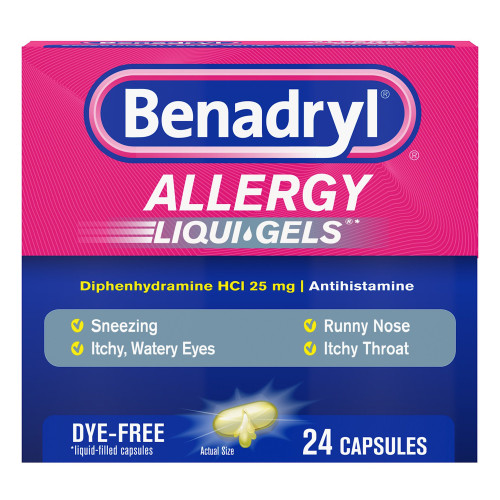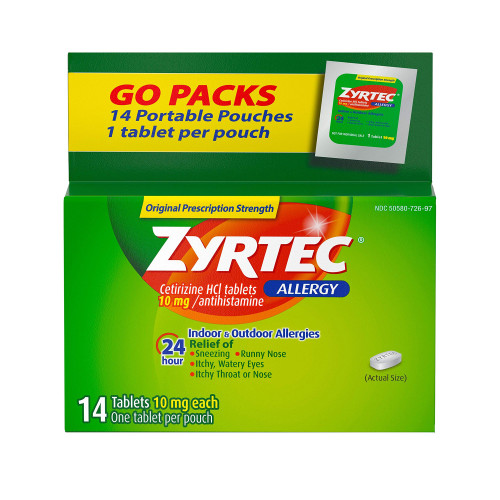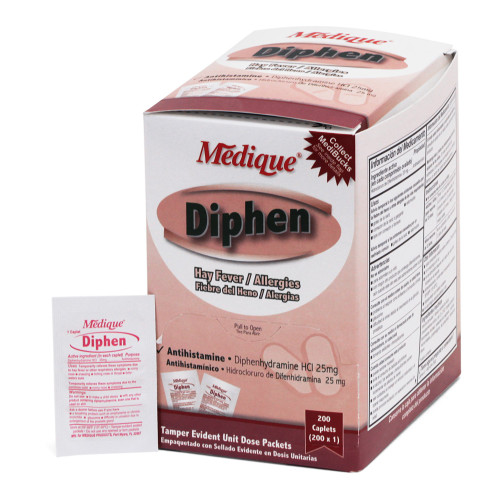-

Tivic ClearUP 2.0
Tivic ClearUP 2.0 Bioelectronic Sinus Relief Device ,
It's not a spray, pill, or flush – it's a revolution that works. ClearUP from Tivic Health offers precise, targeted sinus relief that you control. Powered by patented bioelectronic technology, this device works harmoniously with your body's natural...
$249.99 -

McKesson
McKesson Unflavored Allergy Relief 10 mg Loratadine Tablet
McKesson's allergy relief loratadine tablets are just what you need during allergy season. The tablets help relieve sneezing, runny nose, and the itching and watering of eyes due to upper respiratory allergies. This antihistamine also helps treat itching...
As low as $25.40 -

Claritin Redi Tabs
Claritin Redi Tabs Allergy Relief 10 mg Loratadine Tablet, 30 per Box
Package Count: 30. Nondrowsy Claritin RediTabs offer all-day allergy relief in a melt-in-your-mouth tablet that dissolves instantly without needing water. Claritin's active ingredient – loratadine – is indicated for the symptomatic relief of allergic...
$45.73 -

BENADRYL
Benadryl Allergy Relief, 25 mg, Diphenhydramine HCl Tablet
Use Benadryl Allergy Ultratabs, with 25 milligrams of diphenhydramine HCI, is an antihistamine. It gives effective relief from symptoms related to hay fever, upper respiratory allergy, or cold symptoms such as: sneezing, runny nose, itchy, watery eyes...
As low as $15.04 -

BENADRYL
Benadryl Grape Allergy Relief 25 mg Diphenhydramine HCl Gelcap, 24 per Box
Package Count: 24. Benadryl Allergy Liqui-Gels temporarily relieve symptoms due to hay fever or other upper respiratory allergies: runny nose; sneezing; itchy, watery eyes; itching of the nose or throat.Temporarily relieves symptoms due to hay fever or...
$13.08 -

NorthStar
NorthStar Allergy Relief 180 mg Fexofenadine HCl Tablet, 30 per Bottle
Package Count: 30. Springtime can be rough on allergy sufferers but so can autumn since that's when ragweed (one of the most common plant allergens) starts to release its pollen. Relieve your hay fever and allergy symptoms, such as runny nose, sneezing,...
$22.08 -

Diphen
Diphen Allergy Relief 25 mg Diphenhydramine HCl Tablet, 24 per Box
Package Count: 24. Did you know diphenhydramine, the active ingredient in the well-known allergy relief medication Benadryl, can also be used for motion sickness? Take a Diphen whenever you need to minimize symptoms of either or both.For motion...
$13.84 -

Zyrtec
Zyrtec Allergy Relief 10 mg Cetirizine HCl Tablet, 14 per Box
Package Count: 14. Get fast relief of seasonal allergies to enjoy your day with Zyrtec Allergy relief 10-milligram strength tablets. Each one contains the active ingredient cetirizine HCL, an antihistamine that works quickly and lasts for up to 24 hours...
$23.72 -

Allegra
Allegra Allergy Relief 180 mg Fexofenadine HCl Tablet, 30 per Box
Package Count: 30. This powerful antihistamine gives you 24 hours of the fastest nondrowsy relief from indoor and outdoor allergy symptoms, including: sneezing, runny nose, itchy, watery eyes, and itchy nose and throat.Antihistamine 24-hour allergy...
$34.91 -

Diphen
Diphen Allergy Relief 25 mg Diphenhydramine HCl Tablet, 200 per Box
Package Count: 200. Did you know diphenhydramine, the active ingredient in the well-known allergy relief medication Benadryl® (a registered trademark of Kenvue), can also be used for motion sickness? Take a Diphen whenever you need to minimize symptoms...
$25.38 -

Zyrtec
Zyrtec Allergy Relief 10 mg Cetirizine HCl Tablet, 60 per Bottle
Package Count: 60. Get fast relief of seasonal allergies to enjoy your day with Zyrtec Allergy relief 10-milligram strength tablets. Each one contains the active ingredient cetirizine HCL, an antihistamine that works quickly and lasts for up to 24 hours...
$39.75 -

Chlorphen
Chlorphen Allergy Relief 4 mg Chlorpheniramine Maleate Tablet, 1 per Box
Package Count: 250. Chlorphen chlorpheniramine maleate tablets target and alleviate common allergy symptoms such as sneezing, runny nose, itchy and watery eyes, and scratchy throat. Feel better fast and enjoy your day without the repeated distraction of...
$19.31
Allergy Relief

Allergy Relief
Achoo! You’re sneezing, your nose is stuffy, and your eyes are watering. If it’s not a cold or other bug, it might be allergies. When people suffer from seasonal allergies, they are often experiencing a common type of chronic allergic reaction referred to as hay fever or allergic rhinitis.
Over 50 million Americans experience seasonal allergies each year—it’s very common. Even though it’s called “seasonal” allergies, allergic rhinitis can occur year-round, although many people find fall and spring to be the worst time period.
Common Allergy Symptoms
Unfortunately, allergy symptoms typically last for as long as the allergen is in the air, or as long as you are exposed to the specific trigger. This could be several weeks or months, depending on the situation.
Why Do I Experience Allergy Symptoms?
Allergy symptoms occur when your body mistakes a harmless substance (such as plant pollen) as a threat and reacts accordingly for a dangerous invader. Your body produces a chemical called histamine to protect you, which is the source of many allergy symptoms such as sneezing and a stuffy nose.
Cities with the Worst Seasonal Allergy Problems
If you live in one of these cities, you might experience allergies more frequently and more severely. It’s nothing to worry about, but it is good to know—especially if you recently moved to one of these locations and are having more allergy flare-ups than before.
These cities are ranked for being the least challenging places to live in terms of seasonal allergies.
There are a variety of medications available to help reduce the symptoms of seasonal allergies. Typical over-the-counter (OTC) medications include:
Seasonal Allergy Treatments: Home Remedies
While research on the topic is mixed, you can try a few home remedies if you have spring allergies.
Reducing Your Exposure to Allergens
One of the most effective things you can do if you suffer from seasonal allergies is to reduce your exposure to allergens.
Check out Simply Medical to shop for allergy supplies and other healthcare products that are cost-effective and delivered right to your door.
Achoo! You’re sneezing, your nose is stuffy, and your eyes are watering. If it’s not a cold or other bug, it might be allergies. When people suffer from seasonal allergies, they are often experiencing a common type of chronic allergic reaction referred to as hay fever or allergic rhinitis.
Over 50 million Americans experience seasonal allergies each year—it’s very common. Even though it’s called “seasonal” allergies, allergic rhinitis can occur year-round, although many people find fall and spring to be the worst time period.
Common Allergy Symptoms
- Sneezing
- Runny nose
- Blocked nose
- Coughing
- Itchy throat
- Itchy, watery eyes
- Tiredness
- Headache
- Pollen
- Dust
- Pet Dander
- Mold
- Cockroaches
- Grass
Unfortunately, allergy symptoms typically last for as long as the allergen is in the air, or as long as you are exposed to the specific trigger. This could be several weeks or months, depending on the situation.
Why Do I Experience Allergy Symptoms?
Allergy symptoms occur when your body mistakes a harmless substance (such as plant pollen) as a threat and reacts accordingly for a dangerous invader. Your body produces a chemical called histamine to protect you, which is the source of many allergy symptoms such as sneezing and a stuffy nose.
Cities with the Worst Seasonal Allergy Problems
If you live in one of these cities, you might experience allergies more frequently and more severely. It’s nothing to worry about, but it is good to know—especially if you recently moved to one of these locations and are having more allergy flare-ups than before.
- Scranton, Pennsylvania
- Wichita, Kansas
- McAllen, Texas
- Richmond, Virginia
- San Antonio, Texas
- Oklahoma City, Oklahoma
- Hartford, Connecticut
- Buffalo, New York
- New Haven, Connecticut
- Albany, New York
These cities are ranked for being the least challenging places to live in terms of seasonal allergies.
- Fresno, California
- Phoenix, Arizona
- Provo, Utah
- Denver, Colorado
- Sacramento, California
- Portland, Oregon
- San Jose, California
- San Francisco, California
- Durham, North Carolina
- Seattle, Washington
There are a variety of medications available to help reduce the symptoms of seasonal allergies. Typical over-the-counter (OTC) medications include:
- Antihistamines combat itching, sneezing, and runny nose by reducing the amount of histamine circulating in your body.
- Decongestants work by constricting the blood vessels in your nose, reducing swelling and congestion.
- Combination drugs combine antihistamines and decongestants in one dose.
- OTC nasal sprays moisturize dry nasal passageways and thin out mucus, reducing congestion.
Seasonal Allergy Treatments: Home Remedies
While research on the topic is mixed, you can try a few home remedies if you have spring allergies.
- Butterbur herb may work as an antihistamine. Consult your local herbalist or an herbal how-to for instructions on preparation.
- Stinging nettle herb. Although its use hasn’t been scientifically validated, stinging nettle has a long history as a remedy for allergy symptoms.
- Quercetin. Available as a dietary supplement, this nutrient is reputed to block histamines.
Reducing Your Exposure to Allergens
One of the most effective things you can do if you suffer from seasonal allergies is to reduce your exposure to allergens.
- Check local pollen counts and stay indoors when pollen is high
- Keep your grass mowed
- Keep doors and windows closed and use an air filtration system or run your air conditioner
- Wash your hair daily, as it traps pollen
- Change clothes and shoes after spending time outdoors
- Vacuum floors often to remove pollen tracked or blown indoors
- If you do work outside in the garden, wear gloves to keep pollen and other irritants off your hands.
Check out Simply Medical to shop for allergy supplies and other healthcare products that are cost-effective and delivered right to your door.
